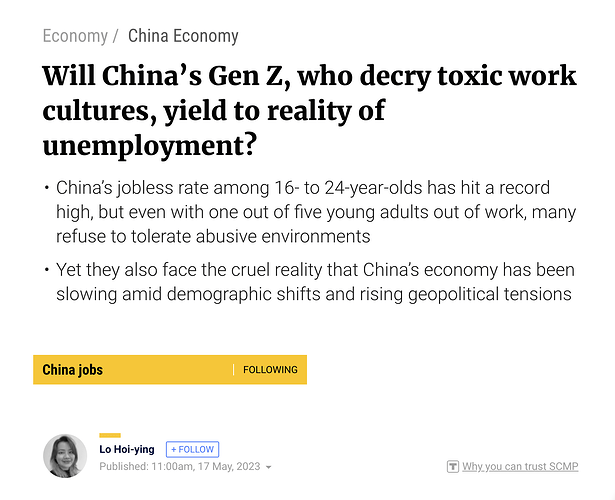-
22岁的中国工人Melody Yan向她的前雇主发送了一封长达2000字的电子邮件,批评他们的运作效率低下,以及缺乏对新员工的支持。她还指控她的上司有性骚扰行为。在中国,16-24岁的失业率为20.4%,但她是越来越多的年轻工人中的一员,对工作场所的虐待和不公正现象发表了意见。
-
中国的几代人是按年代来定义的,2000年后的人,即林浩,被认为是中国的Z世代。Yan现在在上海的一家国际银行担任投资分析师,她不怕经常换工作,以找到适合自己兴趣的工作。在她寻找合适的工作时,她的父母在经济上支持她。
-
中国年轻工人在网上发表反对其上司的帖子和视频已经走红,志同道合的人赞扬他们的言论,希望改变中国的有毒工作文化。
-
22岁的中国工人Melody Yan向她的前雇主发送了一封2000字的电子邮件,批评他们的运作效率低下和缺乏对新员工的支持,并指责她的上司有性骚扰行为。
-
Yan在上海的一家国际银行担任投资分析师,她并不害怕频繁转换工作,以找到适合自己兴趣的工作。
-
中国年轻工人在网上发表反对其上司的帖子和视频已经走红,许多人赞扬他们的发言,希望改变中国的有毒工作文化。
-
一项针对7000多名Z世代员工的职场态度的调查发现,这个年龄段的人把自己的情感幸福和职业发展放在首位,对友好的工作文化提出了更高的标准,并希望将自己的职业与自己的兴趣相匹配。
-
雇主应该尝试更好地理解年轻工人想要表达的东西,因为中国在后科维德时代面临着不稳定的复苏,年轻成年人中逐渐上升的失业率仍然是中国最大的挑战之一。
-
由于经济不稳定和缺乏讨价还价的能力,Z世代的一些成员最终可能会容忍工作场所的虐待行为,就像老一代人更容易做的那样。
-
在江苏省南通市一家报社工作的Roselyn Wang说,她试图在工作中设定界限,在她的微信简历中写道,晚上11点后她可能不会回复信息,但是她的上司无视这一点,仍然与她联系。
-
一些中国年轻人说,Z世代工人与老板顶嘴的趋势不过是耸人听闻的、由互联网助长的污名,最终会造成伤害。
-
每一代人都有自己的价值观和优先事项,Z世代对工作的态度可能会让他们之前的几代工人感到惊讶,但他们对工作文化转变的贡献不应该被忽视。
-
Melody Yan, a 22-year-old Chinese worker, sent a 2,000-word email to her former employer to criticize their operational inefficiencies and lack of support for new staff. She also accused her supervisor of sexual harassment. The unemployment rate for 16-24 year olds in China is 20.4%, but she is among a growing number of young workers speaking out against mistreatment and injustices in the workplace.
-
Chinese generations are defined by decades, with the post-2000s, or linglinghou, considered China’s Gen Z. Yan now works as an investment analyst at an international bank in Shanghai, and is not afraid to switch jobs frequently to find a job that suits her interests. Her parents support her financially while she looks for a suitable job.
-
Online posts and videos of young Chinese workers speaking out against their supervisors have gone viral, with like-minded individuals praising them for speaking out and hoping to change China’s toxic work culture.
-
Melody Yan, a 22-year-old Chinese worker, sent a 2,000-word email to her former employer to criticize their operational inefficiencies and lack of support for new staff, as well as accusing her supervisor of sexual harassment.
-
Yan works as an investment analyst at an international bank in Shanghai, and is not afraid to switch jobs frequently to find a job that suits her interests.
-
Online posts and videos of young Chinese workers speaking out against their supervisors have gone viral, with many praising them for speaking out and hoping to change China’s toxic work culture.
-
A survey of more than 7,000 Gen Z employees on their workplace attitudes found that this age group was prioritising their emotional well-being and career development, setting higher standards for friendly work cultures and hoping to match their career with their interests.
-
Employers should try to better understand what young workers are trying to express, as China faces an unsteady recovery in its post-Covid era and the gradually rising unemployment rate among young adults remains one of the country’s greatest challenges.
-
Some members of Gen Z may end up tolerating mistreatment in the workplace, as older generations were more prone to do, due to the economic instability and lack of bargaining power.
-
Roselyn Wang, who works for a newspaper in Nantong, Jiangsu province, said she tried to set boundaries at work by writing in her WeChat bio that she might not respond to messages after 11pm, but her supervisors ignore this and still contact her.
-
Some young Chinese people said the trend of Gen Z workers talking back to their bosses is nothing more than sensationalised, internet-fuelled stigma that can end up being harmful.
-
Every generation has its own values and priorities, and Gen Z’s attitudes towards work may come as a surprise to the generations of workers before them, but their contributions to the shift in work culture should not be neglected.
